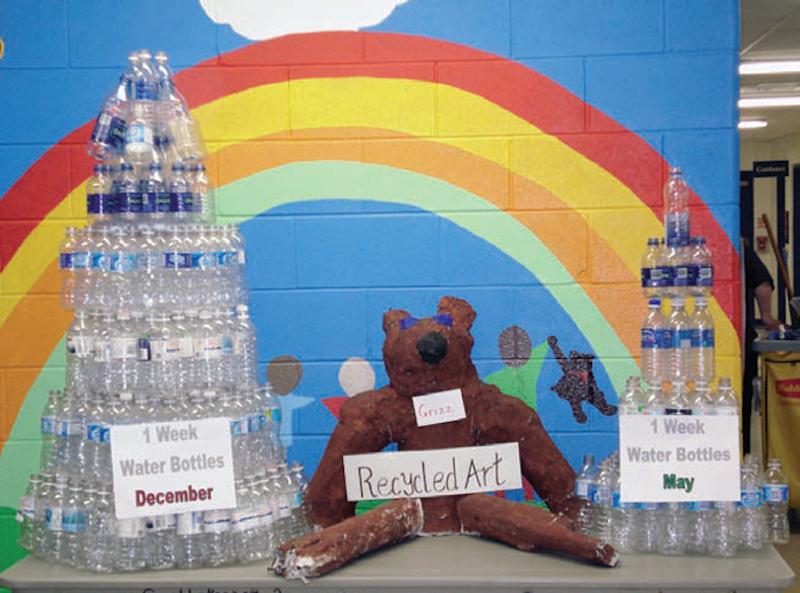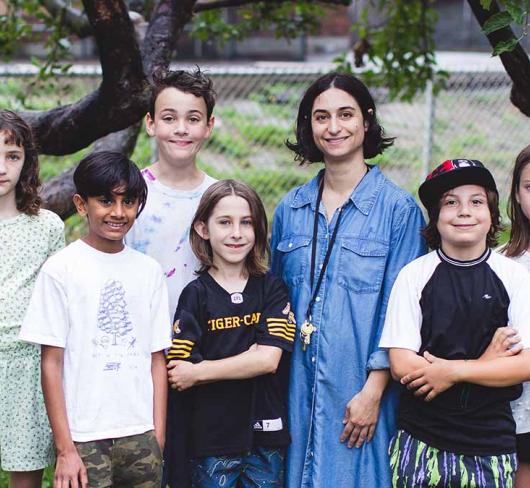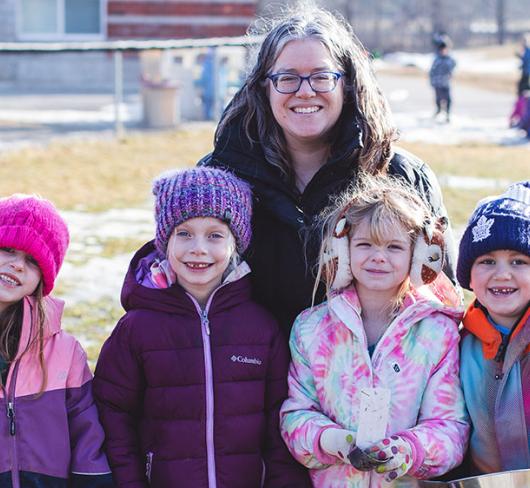
Eco Schools: Energizing Environmental Education in Ontario
The Ontario EcoSchools program is one of the most effective programs for addressing ETFO’s priority of care and protection of the environment. Across Ontario, schools and school boards are turning to this program to address climate change and to help fulfill the requirements of the Ministry of Education’s Environmental Education Policy Framework. The EcoSchools program provides resources and strategies to engage students in environmentally responsible practices and help them develop ecological literacy. Schools can participate in an annual certification process that recognizes their achievements in energy conservation, waste minimization, school ground greening, and the development of ecological literacy. These are the four pillars of the EcoSchools program. Here is a look at how three Ontario schools have used the program.
Ecological literacy
Robert Little PS, a K–5 school in Acton, was one of the first schools in the Halton District School Board to become a certified EcoSchool; it has maintained that status for the past three years. The school is part of the Ontario Focused Intervention Program and – true to their “gold Eco-heart” – teachers chose the theme of Protecting the Environment as a schoolwide focus to address the literacy learning needs of their students.
Teachers and support staff engaged students in community walks, scavenger hunts in the schoolyard and nearby natural areas, and in planting trees, building birdhouses, and creating a school garden. The whole school watched The Lorax (an adaptation of the Dr. Seuss story depicting environmental destruction and restoration) and took part in a follow-up compare and contrast activity. As part of the gradual release of responsibility, students participated in modelled reading, shared reading, guided reading, and independent reading experiences, with care and protection of the environment as the context. As students applied their learning, they created their own illustrated posters and non-fiction books. Those in the youngest grades created Plasticine images.
To prepare for the initiative, staff determined students’ learning needs and identified language curriculum expectations related to comprehension, inferencing, text forms, and text features as their focus. They chose non-continuous text as the main text form. This focus also fit with the School Effectiveness Plan goal related to reading and critical thinking that they had previously identified. Staff held several planning meetings, including meetings with board consultants; gathered a variety of resources; and determined this pre-assessment question to pose to all students: “What might you do to protect the environment and keep it safe? Use evidence from the text and your own ideas to give your answer.”
The post-assessment showed that the results were outstanding. As international research indicates (see seer. org), using the environment as a context for learning leads to increased student engagement and improved achievement. Students’ ecological literacy learning was directly connected to and supported accomplishments in teamwork and leadership, energy conservation, waste minimization, school ground greening, and environmental stewardship throughout the community.
Minimizing waste
At Great Lakes PS in Peel DSB, students practise the 5Rs: rethink, refuse, reduce, and reuse – with recycling as a last resort. To minimize waste, the school has bins containing reusable paper in each classroom and promotes waste-free lunches. Grade 1 students are given reusable lunch bags in the first week of school, and students are encouraged to pack waste-free lunches.
To understand how much waste lunches were creating, each class performed a waste audit on lunch packaging and tracked the number of reusable, recyclable, and non-reusable containers students brought to school. The school passed suggestions for how to pack a waste-free lunch on to parents, and by the end of the year staff noticed positive changes. Waste-free lunch initiatives often take a while to catch on, but the potential reduction in school waste is significant.
Inspired by a presentation at an EcoConference put on by the board, students created and implemented a campaign to reduce the number of single-use water bottles brought to school over the course of the year. Students completed audits and saw significant results: by the end of the year the number of water bottles put into recycling bins had dropped from 250 to 60. Students sold Great Lakes reusable water bottles, and created before/after water bottle sculptures and graphs of their audits, which they posted in the hallway. Ongoing monitoring and school-wide feedback helped them succeed.
Energy conservation
Grade 7 and 8 students at Module de l’Acadie, Limestone DSB, started using EcoSchools in December 2008. Module de l’Acadie is a 7/8 immersion and extended French program, located within Frontenac Secondary School.
Students were doing very well so staff wanted to work on citizenship and community engagement to produce well-rounded students.
The school did not have an environment club – when they formed their EcoTeam these students were starting from scratch. They focused on energy conservation.
To raise awareness, EcoTeam members put Lights Off and Monitors Off stickers around the school and encouraged classes to use natural daylight whenever possible. One unexpected benefit was that many students reported improved concentration.
The team developed checklists for each classroom, itemizing possible conservation measures and strategies. Students in each class- room took turns at ensuring that lights and computer equipment were turned off and drapes were closed at the end of the day. Friendly EcoCops kept an eye on things and reported back on how classes were faring in conserving energy.
Links were also made to curriculum. Students created 3D green dream homes showcasing what they had learned about green building and energy-conserving technologies and materials.
The campaign grew from its initial focus on areas where students could have direct control. The custodian supported energy conservation efforts by turning off the lights in the hallways as soon as they were cleaned. The students drafted an environmental policy for the school that included energy conservation and waste minimization practices, and the EcoTeam took it to the parent council, which gave its support and paid for reusable cups for the lunch program. Students met with the environment club from Frontenac High School to exchange ideas and strategies and elementary and secondary students worked together to plant trees.
Plans for this school year include restarting the EcoTeam in September and making sure that everyone learns about, and participates in, energy conservation. With 50 percent of the school population having moved on, last year’s grade 7s will be the leaders for this year’s new students.
A growing phenomenon
More than 900 schools in 32 boards became certified EcoSchools in 2008–09. The program is appealing because it recognizes and values individual school culture and local environmental issues. It works for schools just beginning to implement environmental education initiatives and for those with highly developed programs. Teacher Mary Jane Jarvis from Module de l’Acadie reflects: “Last year we began by making small changes that were not difficult to implement. This year I would like to motivate students to undertake the most difficult change that they can to help the environment. The most difficult change may be different for each student but will help us create the greatest change in our school’s and our community’s footprint.”
EcoSchools goes beyond the classroom and the individual school. Many levels of the education system are working to address climate change. In the last two years, the Toronto DSB has developed and implemented a renewable energy program. Three projects are in the process of being installed: a geothermal system will provide heating and cooling for a new addition at Highfield PS; a large solar thermal system will provide 40 percent of the heating for Hillcrest Community School; and a 10 kW solar photovoltaic (PV) system will generate green electricity at W.L. Mackenzie CI. The board of trustees has also approved in principle solar PV projects at 11 more schools, which will generate a total of 132,000 kilowatt hours of electricity a year – enough power to take a small elementary school off the power grid.
How EcoSchools began
EcoSchools began at the Toronto District School Board six years ago. Today there are more than 900 schools in over 30 boards that are using the EcoSchools program to engage students and reduce their environmental impact.
Support for teachers
The Ontario EcoSchools steering committee has representatives from seven schools boards who ensure that the program meets the needs of teachers and boards. Boards using the EcoSchools program are asked to designate an EcoSchools representative who keeps teachers up to date with environmental education resources and often provides board-specific professional learning to help teachers engage students in EcoSchools activities. Board representatives also may be able to recommend local environmental education opportunities. Ontario EcoSchools has a website with free resources, including a newsletter and Gallery of Best Practices.
Ontario EcoSchools Certification
The annual certification program (now available on line) assesses a school’s achievement in the four pillars, and in teamwork, leadership, and environmental stewardship. Students and teachers, along with other members of the school community, form an EcoTeam as the first step. The EcoTeam reviews the energy and waste practices of the school, creates and implements an action plan for improvement, then reassesses the energy and waste practices near the end of the school year. Teachers help students develop ecological literacy through the curriculum. School ground greening projects that focus on active participation by students and sustainable greening practices may also be undertaken.
For more information and to access resources go to ontarioecoschools.org.

